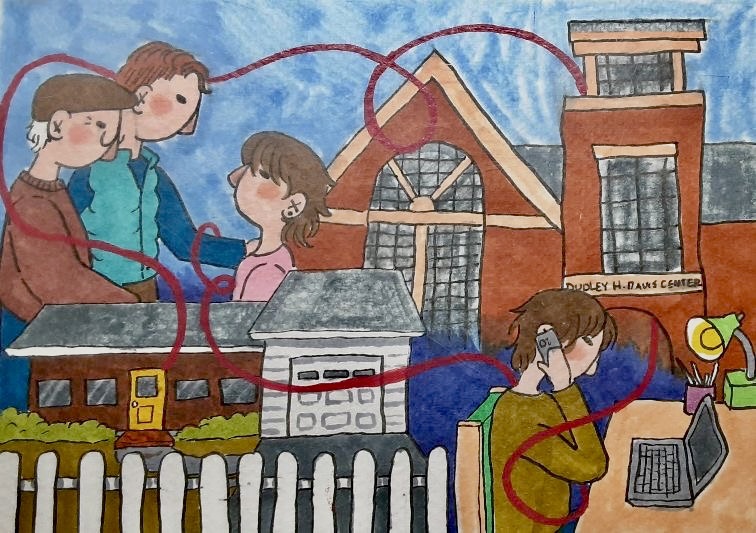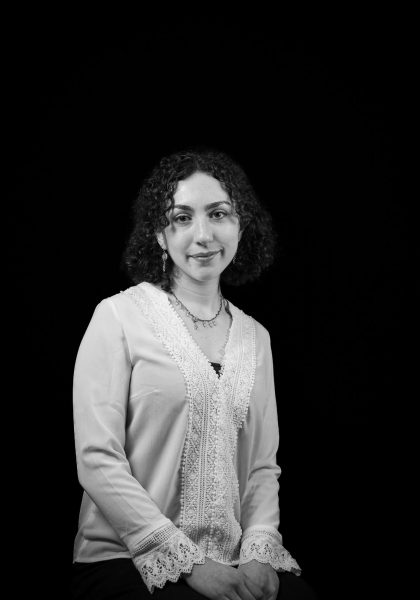In Vermont, family conflict is a remote haze. But when I visit home, all the structures and ideologies I left behind come crashing back into view.
The dynamics that college removes me from become my reality again. They envelop me in a wave of deja vu, reintroducing the static of family feedback.
I can filter out the sound of FOX News on the television, its presence unwavering yet unimportant.
Other things are impossible to block out.
My father and paternal grandfather have a turbulent relationship, one that outdates my existence. Their relationship has been fraught with pain, compounding since my father was a child.
I’ve heard snippets of their story. My dad often jokes about his father’s anger and his punishments when he was young: a broken way of coping with trauma. He inevitably parented my brother and me under the shadow of his past.
In high school, I became comfortable with how things were between my dad and grandfather. The alienated nature of their relationship was completely normal to me.
Moving to college physically removed me from everything I knew. I was no longer constantly entangled in my family’s dynamics and the beliefs my father held.
UVM provided me the space to explore the opinions my father labeled unacceptable.
It also provided the physical distance for me to develop independent insight into the relationship I had with both my father and my grandfather.
I call my dad and my grandfather on the phone separately, fostering an individual relationship with each of them. I visit my grandfather on school breaks, often without my father.
When I am away at school, I often forget their messy past and current situation. They have become two separate entities in my life.
Being physically distant and possessing newfound independence means I can choose how I stay in contact with family and how much energy I pour into our relationships.
Last Christmas included the traditional visit to my grandfather’s. I observed my dad and grandfather, expecting some revelation between them in which all the wrongs of the past were forgiven.
Instead, they discussed surface-level things like my dad’s job and, of course, politics. Strain whirred inside the room.
I’ve realized that between them, politics is a sort of neutral ground. It is something they can agree on. At surface level, this similarity mystifies their history: a kinship existing to avoid ever talking about the past, their mistakes and how, or if, they can forgive each other.
During this spring break, I was home for about 24 hours between flights and buses.
I prioritized seeing my grandfather, as his health is declining. He has multiple myeloma and recently decided to terminate his chemotherapy treatments. His bedroom has morphed into an in-house hospital room.
I left my grandfather’s house, my heart aching because my dad wasn’t at his bedside with me.
As my grandfather’s illness continues to progress, I brace myself for the regret I know that my dad will have when his father passes on. Clouded with words unsaid, I am afraid the time to mend their relationship is running out.
My father remains silent and stoic in the face of the situation, his denial does not let on the sea of complex emotions I know is festering inside him.
This falls in line with his family values. Time and time again, my father’s family lets communication fall to the wayside. When something is painful, an honest conversation is not had. They avoid the subject and often avoid each other.
As a result, the importance of honesty was blurred during my childhood. I only connected what really mattered by disconnecting from home. I found enough clarity to come to my own conclusions once I was outside of the situation.
At first, I equated this to betrayal. By questioning what I was told and the things I knew, I felt I was defying my father and dismissing the reasons for his actions.
I realized instead that I was living authentically to the belief systems that this distance unearthed. My true values strengthened, and I embraced my separation to discover my viewpoints, untainted by others.
I learned: I value honesty and communication. I believe relationships are strengthened by addressing emotional pain. I work to forgive and understand rather than to hold a grudge or attempt to forget.
My new values guide how I choose to live. I’m done tuning things out, clarity has given me confidence.
I know I’ll continue to evolve. I’m still on this path of unraveling what was taught unto me and finding what aligns with who I truly am — it’s both painful and liberating.
I can prompt my dad to visit my grandfather, but ultimately, he must make the decision on his own. As his daughter, I can only support, listen and provide insight with maturity and compassion.
One day, I’ll talk to my dad as honestly as I write. I just have to find the right words.
All the best, Olivia.














